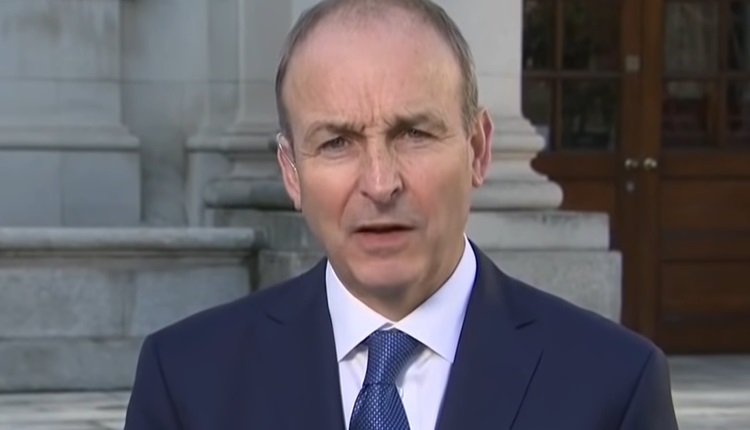Is Ireland flirting with a new kind of divisive politics?
When Leo Varadkar quoted from Mean Girls in June, it may have revealed more about him than we thought. Leaking, undermining his coalition partners, pointed attacks on social media – the Fine Gael leader could be described as a little Lindsay Lohan-esque in his approach to governance. He’s certainly presided over an increasingly divisive political discourse in Ireland, the normalisation of which could be poisonous in the long term.
February’s general election had been bruising. Varadkar had to wait until the 5th count to keep his seat, an acute embarrassment for any party leader, let alone a sitting Taoiseach. At first adopting a vaguely ambivalent, almost sulky persona in reaction to the result, he seemed resigned to a period in opposition. But when the pandemic hit, a panicked nation turned to its caretaker Taoiseach for leadership, and to his credit, he rose to the occasion.
His personal popularity soared. This was true for many world leaders during this period, but the turnaround in Varadkar’s performance in opinion polls was remarkable. The public was surprised to find that despite his apparent indifference to their demands on issues like housing, in a crisis they quite liked his no-nonsense-Mum style of governance. Responding to the Wuhan Bat signal in the sky, Ireland’s blue-caped crusader was the hero the people needed, if not the one they asked for.
Unfortunately, popularity can spoil a person. Since reluctantly accepting a partnership with Michal Martin’s Fianna Fail, it’s been clear that Varadkar feels he should still be calling the shots. He’s been accused of multiple leaks to the media for his own benefit, as well as publicly undermining the Taoiseach on everything from wet pubs to housing policy. It speaks to the fragility of Martin’s leadership that he’s been seemingly unable to put manners on his unruly deputy – worse, he’s repeatedly referred to Varadkar as ‘the Taoiseach’, a Freudian slip that only further confuses the issue. Increasingly, there’s a sense that before Martin goes into cabinet every day he needs to pinch himself to make sure he really got the job.

Varadkar can probably afford to feel confident. If the government were to collapse tomorrow, he’d hope that his newfound appeal would translate into an increase in parliamentary seats from February’s bottom. If the government goes the distance, it will be his turn to serve as Taoiseach in two years anyway, as part of the agreement with his coalition partners. On the face of it, it looks win-win.
While the prognosis looks good for the former GP, we should not underestimate his capacity to misread the room. Admired internationally for his handling of the Brexit negotiations in 2019, Varadkar’s prestige at home was remarkably short-lived. Whatever Republican credentials he acquired in his dealings with Boris Johnson evaporated when word circulated that Fine Gael were planning an RIC commemoration at Easter. An astonishing own goal, the equivalent would have been if Johnson had outmanoeuvred Varadkar only to return to London and rename Oxford Street Gerry Adams Boulevard.
Despite getting the better of his British equivalent, the Tories enjoyed an election landslide while Fine Gael floundered. The experience may have been informative for Varadkar. While clearly different in temperament to Johnson, the temptation to borrow from the Tory school of spin in any future election could be difficult to resist. In August he tweeted “If you are white, male or even worse middle-class, Sinn Féin doesn’t want you”. He was responding to a similarly identity-laden comment from Sinn Fein senator Lynn Boylan, but the statement nevertheless felt uncomfortably like a mainstream Irish politician dipping his toes into the politics of culture war.
If you are white, male or even worse middle-class, Sinn Féin doesn’t want you. So much for an ‘Ireland of equals’ https://t.co/y4FBVsqppq
— Leo Varadkar (@LeoVaradkar) August 12, 2020
More worrying were his pointed remarks on Dr. Tony Holohan in October. Speaking on Claire Byrne Live, the Tanaiste characterised Holohan as an out-of-touch bureaucrat, indifferent to the economic concerns of ordinary people. This rejection of science was remarkable coming from a qualified doctor, but was even more nonsensical given that it was his government which cut the pandemic unemployment payment in the first place. A transparent sleight of hand, attacking experts under the auspices of backing the working man is a move straight out of the populist playbook.
It remains to be seen how far down this road Varadkar and his party will actually be willing to go. What is certain is that in prioritising political manoeuvring over good governance, the benefits of early action in March were squandered. Halfway through a second lockdown, social unity is frayed and is not being helped by a government so clearly devouring itself from the inside.
One of the most polarising figures in Irish politics in a generation, the Tanaiste is certainly different things to different people. A considerable chunk of the population thinks he’s a safe pair of hands. Republicans call him a Thatcherite, while actual Thatcherites dismissed him as a Republican during the Brexit negotiations. The reality is much less colourful: a centrist with a superiority complex, he’s become the perfect canvas onto which his critics can project their anxieties in an increasingly unstable world. While Ireland has so far been immune to the politics of division spreading across the rest of Europe, unless a vaccine is discovered soon, Varadkar could be our patient zero.
